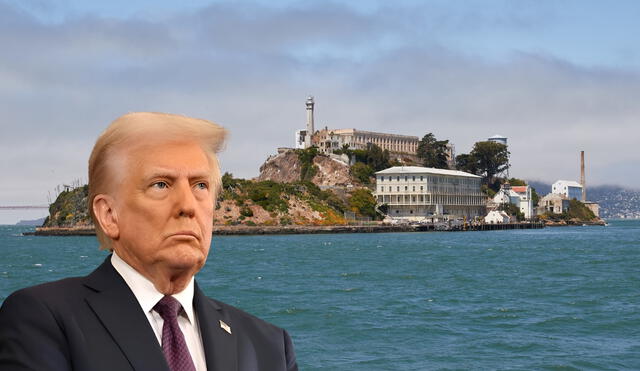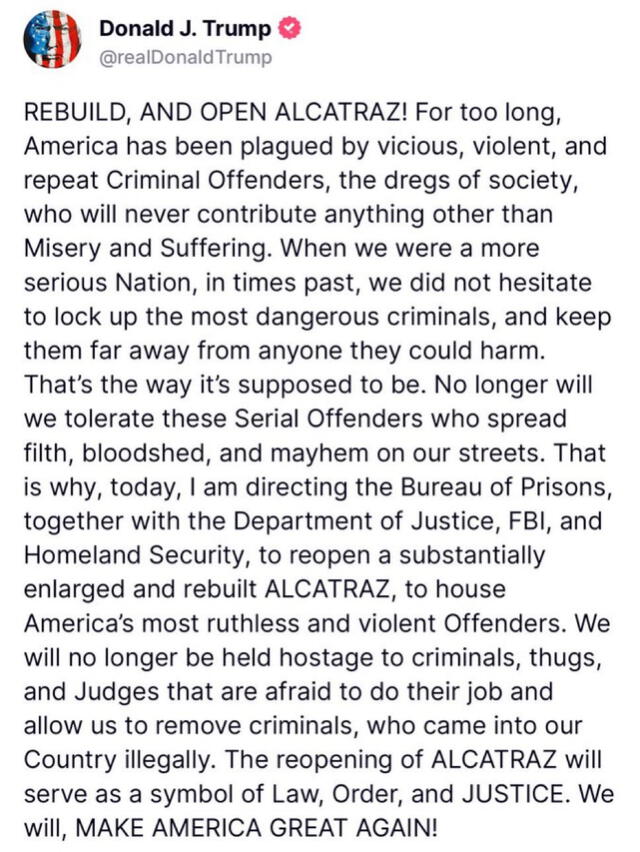Trump orders Alcatraz reopened to House Nation's most violent offenders
Alcatraz could trade tourists for inmates once again, sparking debates on justice and the cost of "tough on crime" policies, similar to those championed by President Donald Trump.

President Donald Trump announced plans to reopen and expand Alcatraz, the historic prison on an island in California that closed in 1963 and now operates as a tourist attraction. In a post on his Truth Social platform, Trump stated the move is aimed at addressing the rise of "vicious, violent, and repeat Criminal Offenders" by isolating them in a high-security facility. He has directed key federal agencies, including the Bureau of Prisons, Department of Justice, FBI, and Department of Homeland Security, to collaborate on rebuilding and enlarging Alcatraz.
Alcatraz Island, located in San Francisco Bay, has a storied past as a federal penitentiary known for housing notorious criminals. Closed in 1963 due to high operational costs and deteriorating infrastructure, it has since become a popular tourist destination managed by the National Park Service. The island's isolation and history have made it a symbol of maximum-security incarceration. Trump's proposal to reopen the facility marks a significant shift in its use and raises questions about the logistics and implications of such a move.
Trump’s Alcatraz revival sparks debate over crime policy, prison reform, and public safety
The president's directive includes collaboration among multiple federal agencies to ensure the successful reopening of Alcatraz. This interagency effort aims to address the complexities involved in transforming a historic site back into a functioning prison. Key considerations include updating security measures, ensuring humane conditions, and integrating modern correctional practices. The initiative reflects Trump's broader agenda to implement stringent measures against crime and reinforce the federal government's role in law enforcement. However, the feasibility and effectiveness of this approach remain subjects of debate among policymakers and the public.

Trump announces plans to reopen and expand Alcatraz as a high-security prison for America's most dangerous criminals, directing multiple federal agencies to oversee the project. Photo: Truth Social
Critics of the plan argue that reopening Alcatraz may not effectively address the root causes of crime and could divert resources from rehabilitation and prevention programs. They express concerns about the potential for human rights violations and the symbolic message of returning to punitive incarceration models. Supporters, on the other hand, view the move as a necessary step to protect society from dangerous offenders and restore public confidence in the justice system.
Alcatraz reopening plan raises global tourism concerns and economic fears in San Francisco
The announcement has also drawn international attention, given the global recognition of Alcatraz as a historical landmark. Tourism stakeholders express concern over the potential loss of a major attraction, which draws millions of visitors annually. The economic impact on the San Francisco area, including job losses and decreased tourism revenue, is a significant consideration. Balancing the site's historical significance with its proposed new function presents a complex challenge for federal and local authorities.
As the federal government moves forward with plans to reopen Alcatraz, detailed assessments and planning will be essential to address the myriad logistical, ethical, and financial considerations. The initiative underscores the administration's commitment to a tough-on-crime stance but also highlights the complexities involved in repurposing a historic site for modern correctional use. Ongoing dialogue among policymakers, law enforcement, community members, and human rights advocates will shape the trajectory of this controversial proposal.













